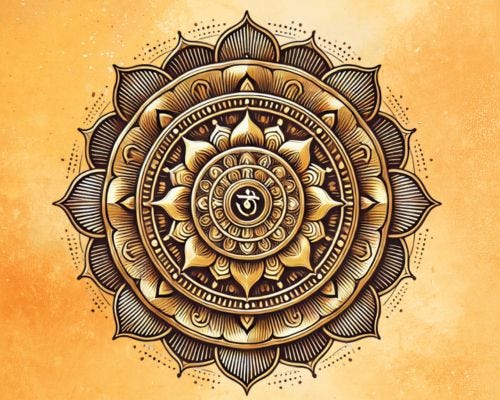
Growing up, I often heard the word 'Dharma' in conversations about ethics and spirituality. But it wasn’t until I studied it deeper that I truly understood its overpowering significance.
Imagine a society where every individual acts in harmony with their purpose. This is the heart of Dharma.
In order to understand an object or subject, one must understand the essence of it. That essence or the inner inseparable quality of a thing is what in Sanskrit they call Dharma. We derive the term dharma from the Sanskrit root verb dhr, meaning ‘to uphold or sustain’.
Dharma is a timeless and universal principle that outstrips individual religions and philosophies in Indian tradition. It serves as a guide for righteous living, social harmony, and spiritual evolution..
By aligning with dharma, individuals contribute to both personal fulfillment and the greater good. In English, it can roughly be translated as the rightful duty of a person and the purpose for which he was born, for example, a person’s dharma is to be a doctor, warrior, priest, parent, etc.
In Hinduism, it is the dharma of the bee to make honey, of a cow to give milk, of the sun to radiate sunshine, of the river to flow.
In terms of humanity, dharma is the need for the effect of and essence of service and interconnectedness of all life.

“धर्मः तस्माद्धर्मात् परं नास्त्य् अथो अबलीयान् बलीयाँसमाशँसते धर्मेण यथा राज्ञैवम् ।
यो वै स धर्मः सत्यं वै तत् तस्मात्सत्यं वदन्तमाहुर् धर्मं वदतीति धर्मं वा वदन्तँ सत्यं वदतीत्य् एतद्ध्येवैतदुभयं भवति ।।”
Nothing is higher than dharma. The weak overcomes the stronger by dharma, as over a king. Truly, that dharma is the Truth (Satya); Therefore, when a man speaks the Truth, they say, “He speaks the Dharma”; and if he speaks Dharma, they say, “He speaks the Truth!” For both are one.
Also read : Verses that can change Life's perception
Regarding humanity, dharma is the need for the effect of and essence of service and integration of all life.
It is a key concept in Hinduism and refers to the four proper goals or aims of a human life, but which are neither independent nor exclusionary, according to Hinduism :
1) Dharma — enables the individual to satisfy the striving for stability and order, a life that is lawful and harmonious, the striving to do the right thing, be good, and be helpful to others and society.
2) Artha — the striving for a means of life such as food, shelter, power, security, material wealth, etc.
3) Kama — the striving for sex, desire, pleasure, love, emotional fulfillment, and
4) Moksha — the striving for spiritual meaning, liberation from the life-rebirth cycle, self-realization in this life, and so forth.
Dharma in Different Contexts
1. Personal Dharma (Swadharma):
One’s duty is according to their role, stage of life, and individual nature. For example:
> A student has to learn.
> A householder has to care for his family and contribute to society.
> It is the dharma of the bee to make honey, of a cow to give milk, of the sun to radiate sunshine, of the river to flow.
2. Social Dharma: Duties and responsibilities towards society, including respect for laws, traditions, and collective well-being.
3.Cosmic Dharma: The universal laws that govern the functioning of the cosmos, as expressed in texts like the Vedas.
4.Spiritual Dharma: The path to spiritual growth and realization of the divine.ok
Dharma in Indian Traditions

Hinduism:
> Dharma is one of the four aims of life (Purusharthas), along with Artha (wealth), Kama (desire), and Moksha (liberation).
> The Bhagavad Gita emphasizes Swadharma (personal duty) and acting without attachment to outcomes.
Buddhism:
> Dharma refers to the teachings of the Buddha, which guide individuals toward liberation (Nirvana).
> It also denotes universal truths such as the Four Noble Truths and the Eightfold Path.
Jainism:
> Dharma is viewed as both the moral law and a cosmic principle that facilitates movement and rest in the universe.
> Ethical conduct, including non-violence (Ahimsa), is central to Jain dharma.
Sikhism:
> Dharma involves living truthfully, serving others, and following the divine will as revealed in the Guru Granth Sahib.
Also read: Sacred Om in Different Faiths
Importance of Dharma
1. Personal Balance: Guides individuals in their roles, fostering inner harmony.
2. Social Order: Maintains ethical and social stability.
3. Spiritual Growth: Leads individuals toward liberation and self-realization.
4. Cosmic Harmony: Ensures the universe operates in balance.
Conclusion
It is said to be the eternal truth and defines that all souls, whether humans, birds, or animals, are equal and the same, but they are born to different yonis (forms) because of their past karmas.
So, friends, we can say the actions of an individual may alter the course of society, for better or worse. The following words echo this “धर्मो धारयति प्रजा: meaning dharma is that which holds and provides support to the social construct.”
However, Dharma is universal and eternal. Dharma is not Buddhist, Christian, Hindu, Jain, Jewish, Muslim, etc. These are all different religions or sects.
With no disrespect towards any religion
Follow me on envigblogs.com

Comments
Post a Comment